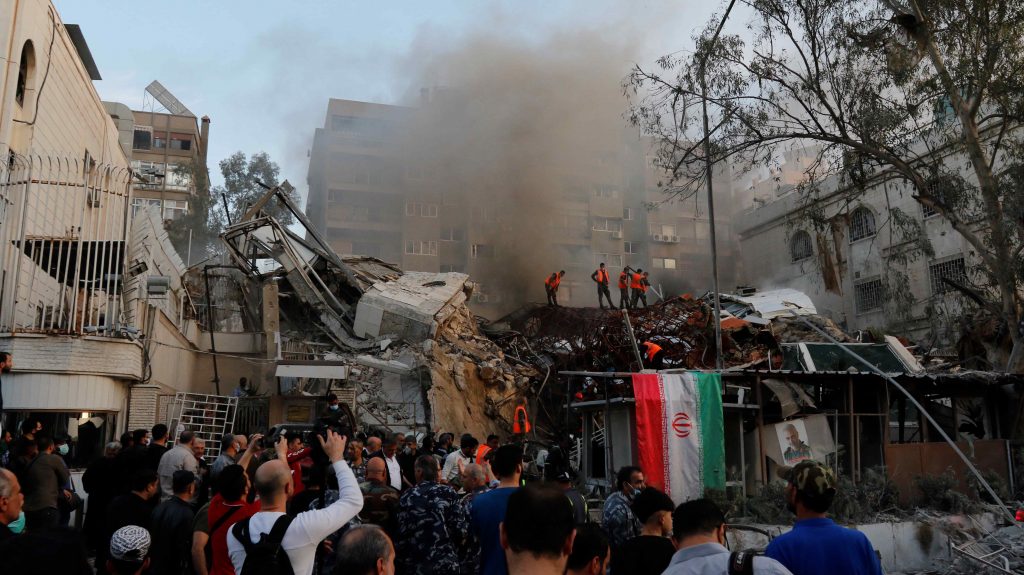TEL AVIV—Israel is preparing for a direct attack from Iran on southern or northern Israel as soon as Friday or Saturday, according to a person familiar with the matter. A person briefed by the Iranian leadership, however, said that while plans to attack are being discussed, no final decision has been made.
Iran has publicly threatened to retaliate for an attack last week in Damascus, Syria , that Tehran said was an Israeli airstrike on a diplomatic building. The strike killed top Iranian military officials, including a senior member of the Islamic Revolutionary Guard Corps’ elite Quds Force.
Earlier this week, U.S. intelligence reports showed that an attack on Israeli assets by Iran or its proxies could be imminent, but a source says it now appears that the attack could be within Israel’s borders.
A U.S. official with knowledge of the matter said Thursday that American intelligence reports indicate an Iranian retaliatory strike within days, “possibly on Israeli soil” as opposed to Israeli interests elsewhere.
On Thursday, the American Embassy in Israel said U.S. government employees and family members would be restricted from any personal travel outside of central Israel, Jerusalem and Beersheba until further notice.
Gen. Michael Erik Kurilla, commander of U.S. Central Command, which is responsible for military operations in the Middle East, was in Israel on Thursday, defense officials said.
Israeli Prime Minister Benjamin Netanyahu , speaking from an air base in southern Israel, also on Thursday, vowed to respond directly against any attack on Israel. “Whoever harms us, we will harm them. We are prepared to meet all of the security needs of the State of Israel, both defensively and offensively,” he said.
Syria also accused Israel of carrying out the attack, which killed Gen. Mohammad Reza Zahedi, who managed Iranian paramilitary operations in Syria and Lebanon, according to Iranian state media and U.S. officials. Zahedi was the highest-ranking Iranian military official to be killed since the January 2020 U.S. assassination of Gen. Qassem Soleimani in Baghdad.
At least six other Iranian militants were killed in the strike, Iran’s Revolutionary Guard said.
An Israeli military spokesman said that intelligence showed the building hit in Damascus wasn’t a diplomatic facility but a building that the Quds Force uses and is disguised as a civilian site.
Earlier this week, Iran’s Revolutionary Guard contacted the country’s Supreme Leader Ayatollah Ali Khamenei with several options to strike Israeli interests, said an adviser to the paramilitary force. The scenarios under consideration include a direct attack on Israel with sophisticated medium-range missiles, he said.
In recent hours, social-media accounts close to the Revolutionary Guard have posted videos showing simulated missile attacks on Israel’s Haifa airport and its nuclear facility in Dimona. An Iranian official has also previously said Iran would strike at Israel’s power and desalination plants if attacked.

estruction at the site of an airstrike next to the Iranian embassy in Damascus, Syria, 01 April 2024. According to the Syrian Arab News Agency SANA, Israel on 01 April launched an airstrike targeting the Iranian consulate building in Damascus. The embassy was damaged while the building annexed to it was destroyed. EPA/YOUSSEF DAFAWWI
But Khamenei has yet to decide on the plans. He is concerned a direct attack could backfire with the projectiles being intercepted and Israel responding with a massive retaliation on Iran’s strategic infrastructure. “The strike plans are in front of the Supreme Leader and he is still weighing the political risk,” the adviser said.
The scenarios involve attacks by Tehran’s proxies in Syria and Iraq, for which Iran delivered drones out of warehouses in recent days, according to advisers to the IRGC and the Syrian government.
Iran and its allies could also attack the Golan—a disputed territory annexed by Israel from Syria in 1981—or even Gaza, they said, to avoid an attack within Israel’s internationally recognized territory. Another option would be to strike at Israeli Embassies, notably in the Arab world, to show them that friendly ties with Tel Aviv could be costly, these people said.
Meanwhile, the international community has been scrambling to avoid an escalation. On Thursday, Annalena Baerbock and David Cameron, respectively the foreign ministers of Germany and the U.K., both called their Iranian counterpart, Hossein Amir-Abdollahian , to ask Tehran not to attack Israel, according to British and Iranian officials.
“Calls have been made by several regional and European ministers to Iran’s Foreign Minister,” a spokesman for Iran’s mission at the United Nations in New York told The Wall Street Journal.
Write to Dov Lieber at dov.lieber@wsj.com , Benoit Faucon at benoit.faucon@wsj.com and Warren P. Strobel at Warren.Strobel@wsj.com


